Serving 85 students in grades Kindergarten-8, Success Institute Charter ranks in the bottom 50% of all schools in North Carolina for overall test scores (math proficiency is bottom 50%, and reading proficiency is bottom 50%).
The percentage of students achieving proficiency in math is 30-39% (which is lower than the North Carolina state average of 51%). The percentage of students achieving proficiency in reading/language arts is 30-39% (which is lower than the North Carolina state average of 50%).
The student:teacher ratio of 21:1 is higher than the North Carolina state level of 15:1.
Minority enrollment is 94% of the student body (majority Black), which is higher than the North Carolina state average of 57% (majority Black).
Quick Stats (2025)
- School Type: Charter School
- Grades: Kindergarten-8
- Enrollment: 85 students
- Student:Teacher Ratio: 21:1
- Minority Enrollment: 94%
- Overall Testing Rank: Bottom 50% in NC
- Math Proficiency: 30-39% (Btm 50%)
- Reading Proficiency: 30-39% (Btm 50%)
- Science Proficiency: ≥80% (Top 20%)
- Source: National Center for Education Statistics (NCES), NC Dept. of Education
Top Rankings
Success Institute Charter ranks among the top 20% of public schools in North Carolina for:
Category
Attribute
Most improved public schools
Science Proficiency
Community Size
School Overview
Success Institute Charter's student population of 85 students has declined by 20% over five school years.
The teacher population of 4 teachers has stayed relatively flat over five school years.
School Type
Grades Offered
Grades Kindergarten-8
Total Students
85 students
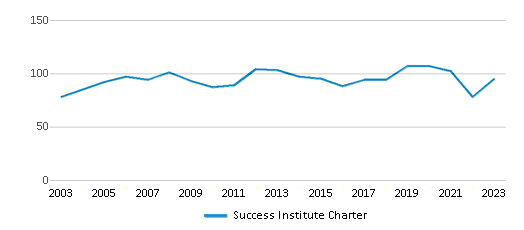
Gender %
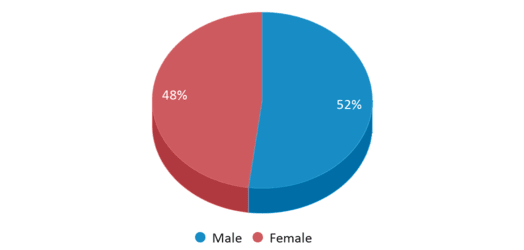
Total Classroom Teachers
4 teachers
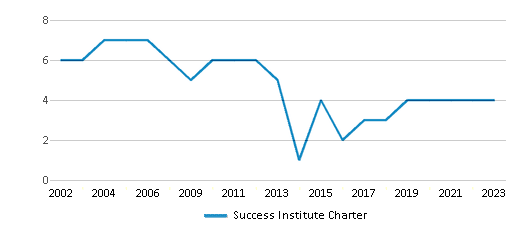
Students by Grade
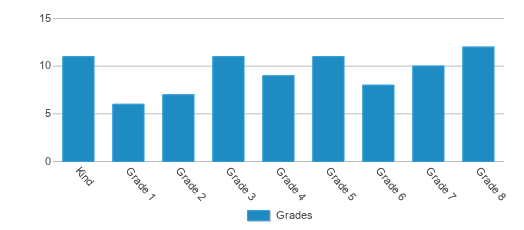
School Rankings
Success Institute Charter ranks within the bottom 50% of all 2,617 schools in North Carolina (based off of combined math and reading proficiency testing data).
The diversity score of Success Institute Charter is 0.26, which is less than the diversity score at state average of 0.71. The school's diversity has stayed relatively flat over five school years.
Overall Testing Rank
#2082 out of 2617 schools
(Bottom 50%)
(Bottom 50%)
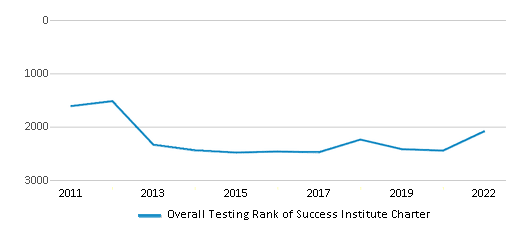
Math Test Scores (% Proficient)
30-39%
51%
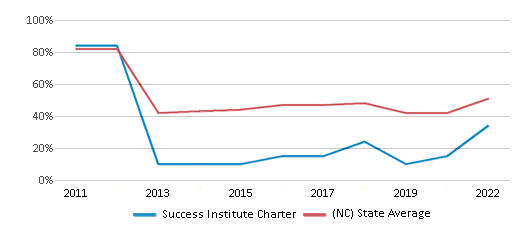
Reading/Language Arts Test Scores (% Proficient)
30-39%
50%
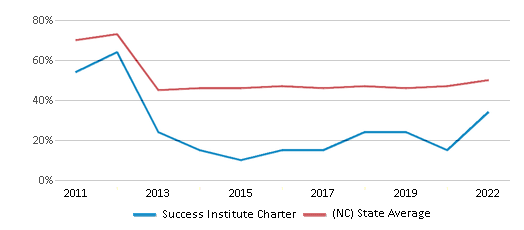
Science Test Scores (% Proficient)
≥80%
63%
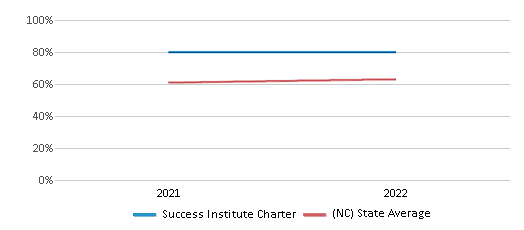
Student : Teacher Ratio
21:1
15:1
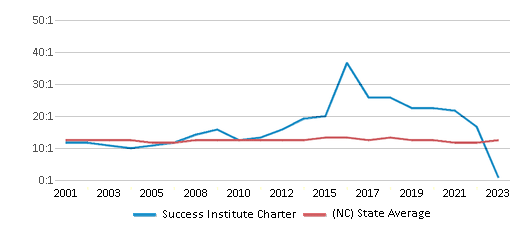
American Indian
n/a
1%
Asian
n/a
4%
Hispanic
3%
21%
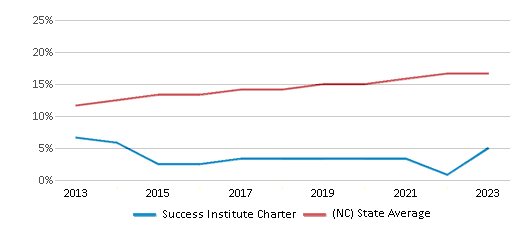
Black
86%
25%
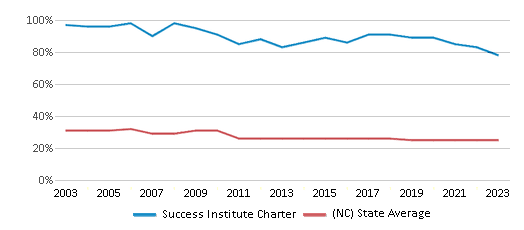
White
6%
43%
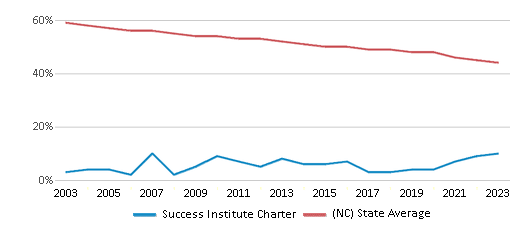
Hawaiian
n/a
n/a
Two or more races
5%
6%
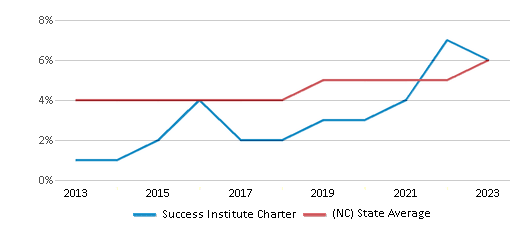
All Ethnic Groups
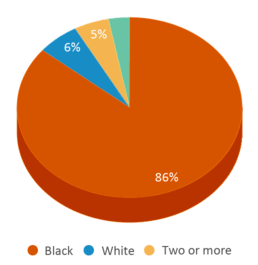
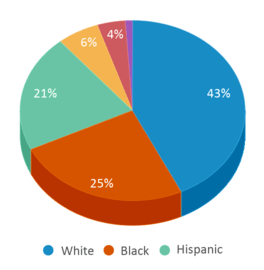
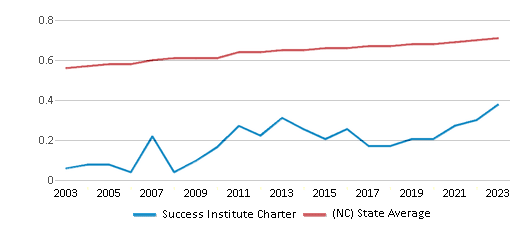
Participates in the National School Lunch Program (NSLP)
Yes
Eligible for Free Lunch
96%
68%
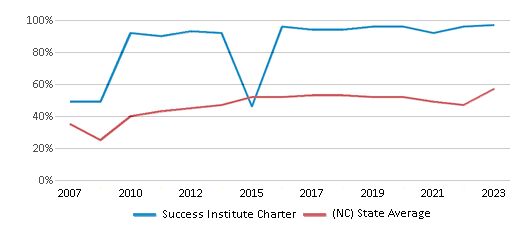
Eligible for Reduced Lunch (14-15)
6%
5%
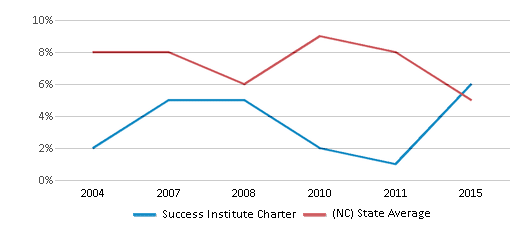
School Statewide Testing
School District Name
Source: National Center for Education Statistics (NCES), NC Dept. of Education
Profile last updated: 02/09/2025
Frequently Asked Questions
What is Success Institute Charter's ranking?
Success Institute Charter is ranked #2082 out of 2,617 schools, which ranks it among the bottom 50% of public schools in North Carolina.
What schools are Success Institute Charter often compared to?
Success Institute Charteris often viewed alongside schools like Third Creek Middle School, Oakwood Middle Ib School by visitors of our site.
What percent of students have achieved state testing proficiency in math and reading?
30-39% of students have achieved math proficiency (compared to the 51% NC state average), while 30-39% of students have achieved reading proficiency (compared to the 50% NC state average).
How many students attend Success Institute Charter?
85 students attend Success Institute Charter.
What is the racial composition of the student body?
86% of Success Institute Charter students are Black, 6% of students are White, 5% of students are Two or more races, and 3% of students are Hispanic.
What is the student:teacher ratio of Success Institute Charter?
Success Institute Charter has a student ration of 21:1, which is higher than the North Carolina state average of 15:1.
What grades does Success Institute Charter offer ?
Success Institute Charter offers enrollment in grades Kindergarten-8
What school district is Success Institute Charter part of?
Success Institute Charter is part of Success Institute Charter School District.
School Reviews
5 5/1/2007
I highly recommend this sohool to other parents when you are looking for everything you need in a school. I am especially impressed with the MicroSociety Program that is at this school. This program enables children to learn not only academically but socially and how to cope with things of the world also how to become great leaders and entrepreneurs. This school was a great blessing to my child when she was unable to get the appropriate help she needed dealing with a speech problem that she had. This school has an exceptional academic program. My child was involved not only academically but in every area. My child had low self-esteem at one point of time but I can truly say with the help of the principal and staff today she has become a great leader and whereas her grades were low at a point of time she now is a honor student.
Review Success Institute Charter. Reviews should be a few sentences in length. Please include any comments on:
- Quality of academic programs, teachers, and facilities
- Availability of music, art, sports and other extracurricular activities
Recent Articles

What Is A Charter School?
Explore the world of charter schools in this comprehensive guide. Learn about their history, how they operate, and the pros and cons of this educational innovation. Discover key facts about charter schools, including admission policies, demographics, and funding, as well as what to look for when considering a charter school for your child.

10 Reasons Why High School Sports Benefit Students
Discover the 10 compelling reasons why high school sports are beneficial for students. This comprehensive article explores how athletics enhance academic performance, foster personal growth, and develop crucial life skills. From improved fitness and time management to leadership development and community representation, learn why participating in high school sports can be a game-changer for students' overall success and well-being.

February 05, 2025
Understanding the U.S. Department of Education: Structure, Impact, and EvolutionWe explore how the Department of Education shapes American education, from its cabinet-level leadership to its impact on millions of students, written for general audiences seeking clarity on this vital institution.








